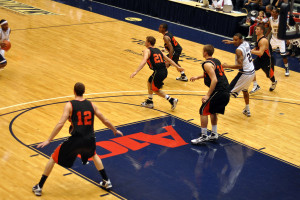Why is our Zone Defence not Working?
A Zone Defence can be a wonderful thing when it is working. However, it can be just as effective in proving easy scoring opportunities for a team’s opposition if not executed well. Execution is one thing and knowing when use the zone defence efficiently is another. There are some fundamental reasons why a zone defence might not be working and with a little attention to detail these once significant problems can be overcome with ease.

Players do not Understand their Roles
It is not uncommon for players to not understand fully their role within the zone defence. This happens more prevalently in the earlier parts of the season. Nevertheless, this will happen as well if a team has not practiced and drilled the various situations that happen in games from time to time.
Over the course of a season the basics of how a zone defence operates will be implemented early on in the piece. What is important then is to start to introduce players to difficult situations which might break down the zone defences rotations or structure. By doing this a coach will help keep players interested with fresh content, but also build competence in their players ability to play under difficult or pressure situations.
Not aware of Shooters
Not knowing who the threats are to a zone defence will eventually lead to trouble. For many zone defences the common issue is competent outside shooting. A coach must be very active in scouting to identify these types of threats then passing this information onto players.
The players then need to be active in identifying these targets to one another during general play. Players off the ball have the greatest responsibility in verbalising where these offensive threats are. Players as they become familiar with how the rotations work should start to know who will be guarding the shooters as the ball moves around the half court. This will mean this defensive player should be able to anticipate the threat and place him or herself in a good position to pressure the shooter.
Players are not Boxing Out
A very common issue within a zone defence is boxing out is not performed as well as it could be. Teams find that because individuals are allocated areas of responsibility defensively, the player therefore feel unless there is an offensive player in their area that they do not have to box out. In most cases, this is not the case and defensive players should still match-up to box out and secure the possession.
To overcome this issue a focus needs to be placed upon this responsibility during five on five situations or breakdowns in training. Verbal communication will also assist those defensive players who have too many offensive targets in their area to box out everyone and require some help from teammates.
Understand where the Opposition is getting their Points from
All zone defence’s have strengths and weaknesses. They allow certain shots from certain positions, but limit scoring opportunities from others. A good offensive opposition will continue to evolve their play against a zone defence in an attempt to find the weakness and they try to exploit it.
For the zone defence when points are being scored with regular ease, there needs to be some analysis of where the points are being scored from. A coach and there assistants need to be mindful of not only what is going wrong, but why it is happening. In doing so a coach can identify what variations need to be made to the team’s tactics and then counter the offensive team’s efforts.
Use a Different Zone to Achieve Different Results
As stated earlier a zone defence will have specific weaknesses. It a team cannot make changes to their tactics to overcome these, then they will need to change their strategy. By having a couple of defensive zone options a team can change between both depending on what is demanded from the situation.
If having another zone defence option is not suitable solution, then specific tactics need to be implemented to change the zones weakness, into a strength. If not then a team must recognise when to rotate to another defensive strategy so they do not overplay the defence and waste precious opportunities to exploit the weaknesses of their opposition.


Leave a Reply